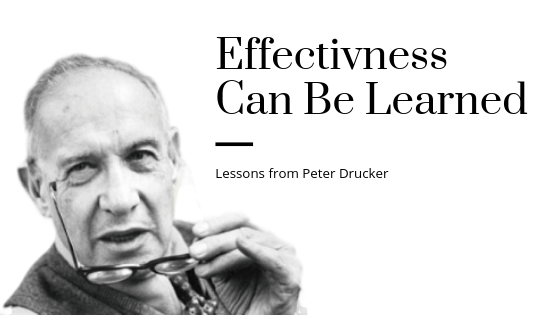
I recently finished reading The Effective Executive by Peter Drucker.
It’s a book on how to get the right things done, not how to get things done as fast as possible.
Conspiring Circumstances
I’ve known about it for quite some time. I first heard Tim Ferriss reference it on his podcast years ago (elsewhere he said that “it’s much more valuable than 99% of the so-called time management books out there” [Business Insider][1]).
It sat on my Amazon Wishlist for a long time, and then on my bookshelf for awhile after that.
There’s a lot I want to read (just check out the aforementioned Amazon Wishlist). Why should I pick up that one?
Not too long ago two conspiring circumstances brought it again to my attention in the span of a week.
One was another episode of [The Tim Ferriss Show][2], this time in an episode with Drew Houston, the CEO of Dropbox.
Houston said it’s a major influence on him alongside Andy Grove’s High Output Management.
To add fuel to the fire, in that same interview Tim mentioned having read it 10 to 12 times.
Tim is one of those people I would consider to be super (or pick any other superlative) effective. For me to even contemplate reading a book twice it has to be exceptional, and so for him to say he’s read a book on effectiveness 10-12 times is a huge vote of confidence.
The other conspiring circumstance was a reference to it I came across in the book A Conviction to Lead where the author mentions it as being the work that taught him the most about the importance of time and how to prioritize it.
Someone was trying to tell me to pick up and read, so, I did.
I wish I had done it sooner.
Managing Oneself for Effectiveness

Drucker describes his work as being about “managing oneself for effectiveness.”
This isn’t something that comes naturally to us. As Drucker says, “effectiveness can be learned––and it also has to be learned.”
The can and has are key.
If you feel like you’re not very effective currently, that can be remedied. You can learn how to become effective.
Moreover, no one was born effective. They had to learn.
That is what this book is all about. What are those practices to learn in order to be effective? And how do we implement them in our work?
Drucker says,
Increasing effectiveness may well be the only area where we can hope significantly to raise the level of executive performance, achievement, and satisfaction.
We cannot manufacture more time in the day, and we cannot clone ourselves so that we have more of us to offer. But as Drucker says,
If one cannot increase the supply of a resource, one must increase its yield. And effectiveness is the one tool to make the resources of ability and knowledge yield more and better results. This is the promise of effectiveness: that while we cannot increase our time, we can use it better. We may always have around the same number of decisions in a day, but we can learn how to make those decisions better, to make them count.
Why write this?
In the episode of the Tim Ferriss Show I mentioned earlier Drew Houston mentions that he thinks of The Effective Executive like a textbook: a book you want to take notes on, to digest, and to master.
That is how I view this series. It’s a way for me to introduce you to the material, but it’s also a way for me to master the book.
I’ve come to a place where I’m done reading the same post on 10 different blogs about how the Pomodoro Technique will solve all of my problems (nothing against the Pomodoro Technique). I’m done reading the latest business book that could have been condensed to a lengthy blog post.
Naval Ravikant said on a podcast with Shane Parrish:
I don’t want to read everything. I just want to read the 100 great books over and over again.
I hope we both can become more effective as a consequence.
- Introduction to The Effective Executive (you are here)
- Today, we are all executives
- Why you are ineffective